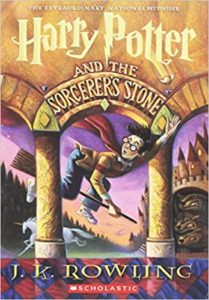 After a 17-year hiatus, Harry Potter and his Quidditch broom have flown back onto the American Library Association’s list of Most Frequently Challenged Books.
After a 17-year hiatus, Harry Potter and his Quidditch broom have flown back onto the American Library Association’s list of Most Frequently Challenged Books.
J.K. Rowling’s beloved boy wizard is suddenly a villain again, at least in the minds of those who want to make it their business what other people read. In 2001 and 2002, Rowling’s “Harry Potter” series, which at the time included only four of the seven Potter books she would ultimately write, was Number One on the ALA’s list. This year, it’s slipped to Number Nine, but the fact that it has reappeared at all is a little unexpected.
Confession: Until I began preparing for this column, I’d never read a Harry Potter book. Back in 1997, when “Harry Potter and the Sorcerer’s Stone” was released in the United States, I bought a copy. My nine-year-old son James was thrilled when I got home with it. “I’ve been wanting to read this forever!” he said. Such words had never come out of James’s mouth and I was, of course, overjoyed. But I told him I wanted to read it first so I could understand what all the buzz was about.
“I’ll hand it over to you in a couple of days,” I promised.
“Sorcerer’s Stone” is a kids’ book. It’s neither long nor complicated. But as I settled into my reading chair on that long-ago night, I couldn’t get into the story. It was clever. It was well-done. It just didn’t hold my interest. At the end of Chapter Three, I slid my bookmark into place and turned off the lamp. Maybe I was just too tired to concentrate.
I tried again the next night. I learned about Muggles. I tagged along with Harry as he shopped for his uniforms and books and cauldron and magic wand. I climbed aboard the train to Hogwarts at Platform Nine and Three-Quarters. Then I lost interest again.
And I still had ten more chapters to read.
James bounded into the kitchen the next morning. “Did you finish?” he asked.
I shook my head. “Maybe tonight.”
That scene repeated itself for almost a week, with James so eager he suggested we each have our own bookmark so he could read the book while I wasn’t reading it. I gave up and handed it over to him, grateful for the magic of “Harry Potter.” Its brilliance is the spell it casts over young readers. J.K. Rowling made reading fun again. She made reading cool. She got kids talking to each other about books. She created a universe so compelling that fans the world over lined up outside bookstores for hours to purchase each of her new Harry Potter novels the minute they were released.
So why would anyone object to such books? Some of those who want “Harry Potter” removed from library and classroom shelves contend that the books “open a doorway that will lead untold millions of kids into hell.” The books are Satanic, critics say. Filled with witchcraft. Evil personified. They should be hurled onto a bonfire or cut up with scissors.
Wow. Clearly, I needed to sit myself down and read “Sorcerer’s Stone” all the way through, whether I wanted to or not. The good news is that I liked it better this time. It’s imaginative. It’s engaging. I’m befuddled as to why anyone would object to it. The wizards and witches and ghosts and goblins and dragons and unicorns and even Fluffy, the terrifying three-headed dog, are all in good fun. The takeaways from the story are positive. Honor your word. Be brave. Money can’t buy happiness.
If Harry Potter books aren’t your cup of tea, that’s okay. Don’t read them. Don’t hand them over to your kids. But please stop trying to keep others from enjoying them.
(September 27, 2020)